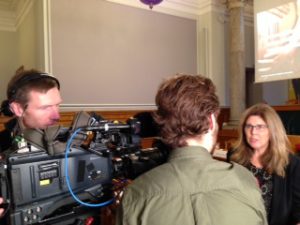Organ Trade Film Making A Difference

Copenhagen, Denmark, December 18, 2013 – Today has been one of those special days that highlights for me and my colleagues why we make documentary films. Our film, “Tales From the Organ Trade”, was screened this morning in the Danish parliament by the Council of Ethics, mandated to provide the Danish parliament with recommendations regarding policies that involve complex ethical issues.
The film was screened in Christiansborg Castle (parliament building) as part of a full day conference dealing with “ethical aspects of the cross border sale of body parts”. The conference focused on commercial surrogacy and the traffic in human kidneys. Six members of the Danish parliament spoke along with various members of the Council of Ethics. Our film (also produced with Felix Golubev) was eloquently represented on the speaker’s podium by my co-producer Ric Bienstock who was the director of the film.
![photo[21]](http://www.simchajtv.com/wp-content/uploads/2013/12/photo21-300x225.jpg) Presently, the buying and selling of kidneys is a criminal activity. “Tales From the Organ Trade” is an inside look at that activity. For the first time ever, our film is able to present an anatomy of a kidney transplant whereby we meet every major player involved; from the seller to the recipient, from the nephrologist to the surgeon. In fact, Ric was able to interview the surgeon while Interpol was trying to locate him.
Presently, the buying and selling of kidneys is a criminal activity. “Tales From the Organ Trade” is an inside look at that activity. For the first time ever, our film is able to present an anatomy of a kidney transplant whereby we meet every major player involved; from the seller to the recipient, from the nephrologist to the surgeon. In fact, Ric was able to interview the surgeon while Interpol was trying to locate him.
For her part, Ric has crafted a nuanced film which demonstrates to people who think they know the issue that “it ain’t necessarily so”. She explodes stereotypes and presents all sides of the issue: the desperate need of the recipients to get kidneys and the desperate need of the sellers to escape poverty. The pros, the cons, and the human face of the issue are explored with subtlety and drama. As a result, our film has already garnered 5 film festival awards and is fast becoming part of the international reassessment with regards to the organ trade. Today, we screened in the Danish parliament and, already, we have been approached by two other parliaments! At the end of the day, international laws will have to change to keep up with the growing demand for kidneys and the advances in transplant technology.

If international legislation changes and if our film plays any part whatsoever in the lead up to those changes…what greater validation for a film can there be? What can be more rewarding than playing a role in the saving of lives? As I said, it’s these moments that remind us of the beauty and power of real documentary filmmaking.
For those of you in Denmark, the film will be broadcast tomorrow night in prime time (Thursday, December 19, 8pm CET on DR2). In the US, look for repeat broadcasts on HBO. For other airings and festival screenings, stay tuned and check the website.
As for me, my views are less nuanced than the film’s. As I stated in my “manifesto”, if you can save lives – you save lives! You start from that fact and you move backwards to make sure that sellers are not victimized in the kidney trade i.e., they’re not coerced, they’re not cheated, they receive proper after care etc. The point of departure should be to protect both buyer and seller. It’s time for parliaments to decriminalize the kidney trade. It’s time for the dying to stop.
Click here to see my recent article “Upside down fish” on The Times of Israel

![photo[22]](http://www.simchajtv.com/wp-content/uploads/2013/12/photo22-300x225.jpg)
